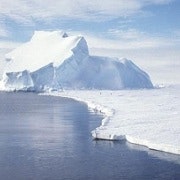The climate change wake-up call we needed?
Calling Hurricane Sandy a disaster almost underplays the enormous devastation wrought by this freakish monster of a storm. Four days after Sandy came ashore just south of Atlantic City, millions are still without power, gas stations are running out of fuel, and the death toll continues to rise.
But for those of us who worry about climate change, Sandy might not have been an unmitigated disaster. The storm wasn't “caused” by climate change, as Climate Central and others made clear. But in at least two, and possibly three ways, global warming almost certainly made Sandy worse than it would otherwise have been.
That connection suggested to many commenters that after so many years of official reluctance to take on the issue climate change — including an unsuccessful U.N. conference in 2009, the failure of Congress to approve a cap-and-trade bill in 2010 and, most recently, the almost complete silence of the presidential candidates on the climate issue (in Obama's case, a deliberate silence that dated back to the early days of his presidency) – that Sandy would serve as a long-awaited wake-up call that will bring action at last. After two years of freakish storms, killer heat waves and terrible droughts, Americans are finally connecting the dots between extreme weather and climate change, so maybe political leaders will, too.
Signs of hope were bursting out all over. “Something important has happened,” super-activist Bill McKibben declared in The Daily Beast. “This is a huge wake-up call,” asserted Tom Brokaw on MSNBC, and Eugene Robinson at the Washington Post insisted that “Climate change is a national challenge. Ignoring it is not a solution.”
In fact, New York Mayor Michael Bloomberg decided not to ignore it: two days after Sandy turned his city upside down, he formally endorsed Barack Obama for president, citing Obama's positive (though limited) steps to limit carbon pollution.
But if we're truly talking about a wake-up call or watershed moment or dramatic turnaround in the nation's commitment to actually do something about the threat of climate change, I remain skeptical. I've been writing about climate since 1987, and I've seen plenty of watersheds. I remember when James Hansen testified before Congress back in 1988, saying “. . . the evidence is pretty strong that the greenhouse effect is here.”
As McKibben reminds us, that consciousness-raising moment led to George Bush (the first) saying in 1988 that he would “fight the greenhouse effect with the White House effect.” In 1989, Time magazine named the endangered Earth “Planet of the Year,” in large part due to the threat of global warming. In 1992, Bush signed a global climate agreement at the “Earth Summit” in Rio.
It was a series of watershed moments, coming in rapid fire, and it led to . . . almost no action at all, ultimately, on climate change. In the two decades since, carbon emissions have continued to grow, driving the concentration of CO2 in the atmosphere steadily upward. This year is on track to be the warmest on record. The 2000s were the warmest decade on record (so far). Arctic sea ice melted back more during the summer of 2012 than any time since modern recordkeeping began.
In short, I've seen wake-up calls before. I've seen the American public and our political leaders wake up, smell the climate coffee (as it were). And I've seen them roll over and go back to sleep again.
So while I fervently hope McKibben and the others are right — that people will finally get it, and will take serious action on climate change — I have my doubts. I do see some prospect that leaders will begin working to protect people from the consequences of climate change, by making changes to cities, power plants and other infrastructure endangered by climate-driven floods, for example. In the especially vulnerable counties of South Florida, this sort of adaptation planning has been under way for a while now.
But if we're talking about cutting our emissions of carbon dioxide and other greenhouse gases — well, you'll have to forgive me, but I'm reserving judgment over whether this wake-up call is any different from the rest.
This article was originally published by Climate Central. Republished with permission.
















